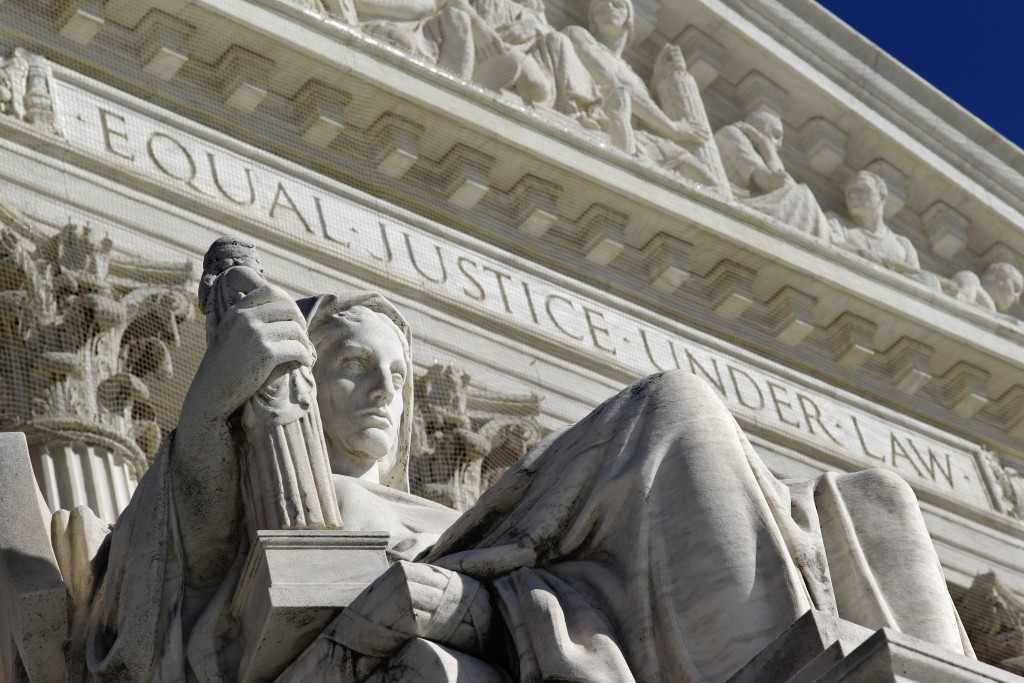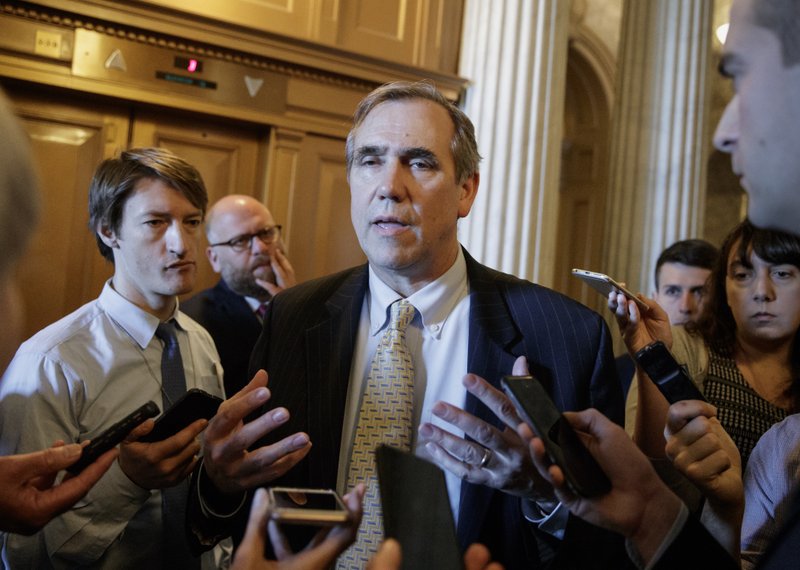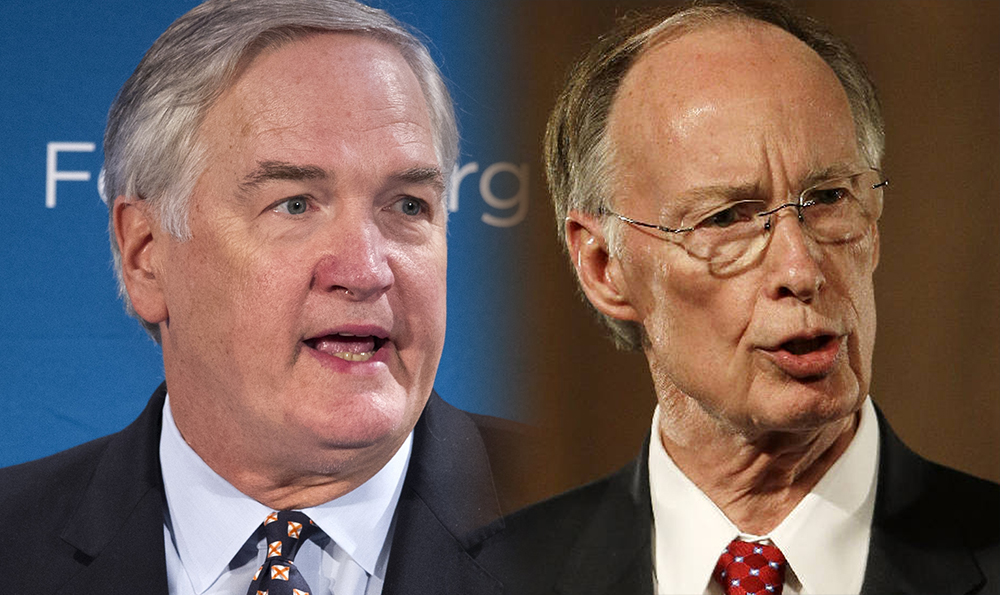Ethics panel finds probable cause Alabama governor broke law

The Latest on the Ethics Commission hearing on Gov. Robert Bentley (all times local): 7:10 p.m. A state ethics panel has ruled that there is probable cause that Alabama Gov. Robert Bentley violated state ethics and campaign finance law in a sex-tinged scandal that has engulfed him for more than a year. The Alabama Ethics Commission voted Wednesday to refer the matter to the district attorney’s office for possible prosecution. The 74-year-old governor has struggled to shake off a scandal after recordings surfaced last year of him making suggestive remarks to a female aide before his divorce. Bentley has admitted making personal mistakes but denied doing anything illegal or that would merit his removal from office. State Auditor Jim Zeigler filed an ethics complaint against Bentley accusing him of using state resources to pursue a relationship with the aide. The commission found probable cause that Bentley misused state resources and improperly accepting a campaign contribution and loan outside allowed fundraising windows. ___ 8:18 a.m. The Alabama Ethics Commission could weigh in soon on whether there’s reason to believe Gov. Robert Bentley broke state law in a scandal that has engulfed him for a year. The commission is expected to go behind closed doors Wednesday to consider the matter. The 74-year-old governor admitted personal mistakes after recorded phone calls surfaced of him making sexually charged remarks to a female aide. However, he maintains he did nothing illegal. State Auditor Jim Zeigler filed an ethics complaint against Bentley accusing him of using state resources to pursue a relationship with the aide. The commission functions like a grand jury and will decide if there is probable cause that Bentley broke the ethics law. The commission could vote to refer the matter for possible prosecution. Republished with permission of The Associated Press.
AG Steven Marshall files brief to protect pregnancy center’s free speech

Attorney General Steven Marshall has joined a 10-state effort, filing an amicus brief urging a federal appeals court to support a religious organization’s right to free speech to allow them to talk about and offer alternatives to abortion. Alabama was part of a coalition’s friend-of-the-court brief, filed April 3 in the 4th U.S. Circuit Court of Appeals. The brief defended a pregnancy center in Maryland, the Greater Baltimore Center for Pregnancy Concerns, against the City of Baltimore’s attempts to undermine its ability to speak about and offer alternatives to abortion. In 2009, the City of Baltimore passed a city ordinance that requires such centers with pro-life pregnancy counselors to post signs telling clients that the facility does not provide abortions or referrals. However, the city fails to require abortion clinics to display the services which they do not offer, including adoption or prenatal care. “The clear aim of the city ordinance is to impede the mission of pro-life counseling centers and silence the expression of religious belief,” said Marshall. “A city cannot treat crisis pregnancy centers different from abortion clinics simply because it dislikes their pro-life message.” Marshall and the other states argue the ordinance uses consumer protection as cover to violate the First Amendment, by targeting the non-commercial speech of charitable organizations who wish to communicate sincerely-held religious beliefs about abortion. Alabama signed onto the West Virginia-led brief with attorneys general from Arkansas, Kansas, Michigan, Nebraska, Ohio, South Carolina, Texas, and Utah.
‘Winter White House’ a winning brand for Donald Trump’s business

No doubt Florida’s oceanfront Mar-a-Lago resort is an impressive site for a summit between the presidents of the U.S. and China. And it’s a pretty nice business advertisement, too, for the owner of the luxurious, members-only private property. That would be Donald J. Trump. Even before this week’s summit, President Trump and his aides had begun referring to Mar-a-Lago as the “Winter White House,” a marketing coup for a man who has made millions selling his personal brand. Now the president is writing his property deeper into American history books by meeting there with China’s Xi Jinping. The two-day summit, partly to discuss sensitive trade issues, follows five previous weekend trips that Trump has made to Mar-a-Lago in the 12 weeks he has been president. On his fourth weekend in office, Japanese Prime Minister Shinzo Abe joined him there, and the two heads of state huddled on the restaurant’s patio before making headlines with a televised joint response to a North Korean missile test. VIP visits to presidential homes are a tradition dating to shortly before World War II, when Franklin D. Roosevelt began inviting dignitaries to his Hyde Park estate north of New York City, according to the U.S. State Department’s historical website. More recently, George H.W. Bush brought leaders to the family’s Kennebunkport, Maine, compound, and his son George W. Bush invited them to his Crawford, Texas, ranch. President Barack Obama hosted Xi at Sunnylands, an estate in the California desert formerly owned by late philanthropists Walter and Leonore Annenberg. But Mar-a-Lago isn’t just a vacation home for Trump. It’s a for-profit part of his global real estate empire. That makes “Winter White House” more than a charming phrase; it’s good for business. Breaking with presidential precedent, Trump held onto ownership of his businesses when he took office, meaning he makes money when his properties do well. The resort doubled its membership fee to $200,000 after he was elected. And “Winter White House” is working its way into marketing materials. When Trump is in town, Mar-a-Lago’s hotel rooms and restaurant reservations fill up fast. The Trump Organization has agreed not to exploit any aspects of the presidency, but those who lease and visit the properties are more than happy to do that work. When the Distressed Investing Summit convened in Palm Beach last month, its brochure noted the opening reception would be “at the famed Mar-a-Lago club, one of the most highly regarded private lairs in the world and the new Winter White House.” Trump hasn’t been shy about mentioning his Florida property, either. A few days before he took office, he tweeted a photo of himself with the message, “Writing my inaugural address at the Winter White House, Mar-a-Lago, three weeks ago.” While the president and vice president are exempt from the promotional prohibitions facing other government employees, there’s an overarching principle that all public officials should avoid using their offices for private gain, said Kathleen Clark, a former ethics lawyer for the District of Columbia and a law professor at Washington University in St. Louis. “The president’s recurrent trips to Mar-a-Lago and other properties he owns, particularly with leaders that make the visits newsworthy, means he is in effect using the presidency to promote his business,” Clark said. “He’s a very effective marketer, and he’s using the presidency as though it’s just part of him being famous and doesn’t come with other moral, if not legal, obligations.” Trump’s presidential visits to his commercial properties go beyond Mar-a-Lago. Since his Jan. 20 inauguration, Trump has made 17 trips to three of his golf courses (two in Florida and one in Virginia) and twice dined at his new hotel in Washington, just down Pennsylvania Avenue from the White House. Trump’s son Eric, who is helping to lead the Trump Organization in his father’s absence, said the Florida property is “his Crawford, Texas.” “You go back at it — all these foreign leaders remember their time in Crawford. They all talk about being there,” Eric Trump said. He said his father similarly forges strong relationships at the Florida property. “That’s how you get a deal done,” he said. “Mar-a-Lago is an impressive place; it makes sense to be there. He’s working. This is how he works.” That’s just fine with local Trump supporters and others who say the visits bring welcome attention, drawing tourists and business. “I think we are all proud here in Palm Beach that we have a president who lives here. We are glad to have him,” says Sid Wrightman, retired owner of an import-export business. But others are unhappy about the detours and extra cars clogging roads during Trump’s frequent visits — and the local money that goes for law enforcement overtime and other expenses. “If this was Barack Obama,” says attorney Tim Morell, the Trump supporters “would be yowling. I would like to see what would happen if the town of Palm Beach and the county said, ‘We aren’t paying, we aren’t sending our guys.’” Trump’s use of the property is a version of what the original owners always imagined. Cereal heiress Marjorie Merriweather Post and her financier husband, E.F. Hutton, built the property in the 1920s and had hoped future presidents and dignitaries would use it as a winter retreat. Upon her death in 1973, Mar-a-Lago was donated to the government, but when presidents declined to use it, it fell into disrepair and was returned to her estate. Trump bought it for $10 million in 1985 and later turned it into a 500-member club in addition to a private vacation home. So far, Trump has not expressed any interest in using Camp David, the government-owned Maryland mountain retreat 62 miles northwest of the White House. Just as the positive P.R. from Trump’s visits to his properties may boost his own bank account, Camp David would be less costly for taxpayers. Trump could eventually face blowback from voters over that, said Clark, the former ethics lawyer. “The combination of a perceived abuse of
Mike Rogers: Protecting our sovereignty, borders and the taxpayer

Great nations throughout history are those that control their own sovereignty. Sovereignty can be defined in different ways, but starts with the freedom to act in the nation’s best interest and controlling who crosses their borders. President Donald Trump has made putting America first a priority for his Administration. I fully support him in this effort and am working hard in Congress to make it a reality. President Trump promised to build a wall on our southern border. I recently introduced legislation that will help make the wall a reality without any additional costs to America’s taxpayer. Each year the countries south of our border benefit from an estimated $50 billion windfall from the U.S. in the form of remittances. In 2015, Mexico received over $24 billion in remittances sent from the United States. My bill, H.R. 1813: the Border Wall Funding Act of 2017, would impose a fee on remittance transactions to South and Central America. The fee revenue would go to an account dedicated to building the wall. The legislation is endorsed by FAIR (Federation for American Immigration Reform) and NumbersUSA. It is time to finally have some real action on securing our borders. I have also introduced the American Sovereignty Restoration Act of 2017, which would end the United States’ involvement in the United Nations (UN). The American taxpayer should not have to bankroll an organization that tries to infringe on our Constitutional rights and supports terrorists over our great ally Israel. The United States does not need the permission of the UN to defend our values and freedoms. I believe we should put America first and get out of the UN. I stand with President Trump on these issues and will continue to push these bills forward. I want to hear from you on this or any issue. Please sign up for my e-Newsletter by visiting mikerogers.house.gov. To stay up to date, you can also like me on Facebook at Congressman Mike D. Rogers, follow me on Twitter, Pinterest and Instagram at RepMikeRogersAL, on Tumblr at repmikerogersal.tumblr.com and you can also subscribe to my YouTube page at MikeRogersAL03. ••• Mike Rogers is a member of U.S. Congress representing Alabama’s 3rd Congressional District.
Donald Trump removes Steve Bannon from National Security Council

President Donald Trump has removed chief strategist Steve Bannon from the National Security Council, reversing an earlier, controversial decision to give Bannon access to the high-level meetings. A new memorandum about the council’s composition was published Wednesday in the Federal Register. The memo no longer lists the chief strategist as a member of the Principals Committee, a group of high-ranking officials who meet to discuss pressing national security priorities. Tom Bossert, the assistant to the president for Homeland Security and Counterterrorism, also had his role downgraded as part of the changes. A senior White House official said Wednesday that Bannon was initially placed on the national security council after Trump’s inauguration as a measure to ensure implementation of the president’s vision, including efforts to downsize and streamline operations at the NSC. Trump’s first national security adviser, Michael Flynn, was at the helm of the NSC at the time, but the official says Bannon’s role on the committee had nothing to do with the troubles facing Flynn, who was later asked to resign for misleading the administration about his communication with Russian officials. The senior White House official was not authorized to discuss changes that have not been formally announced and spoke on condition of anonymity. The new memo also restores the director of national intelligence and the Joint Chiefs chairman to the principals committee. Bannon’s addition to the NSC sparked concerns from Trump critics, who said it was inappropriate for the political adviser to play a role in national security matters. Republished with permission of The Associated Press.
These Alabama colleges give you the best bang for your buck

Wondering where you can get a good college education for a decent price? SmartAsset, a New York-based financial technology company, may be able to help. They recently released the 2017 Best Value Colleges list for the state of Alabama. So which Alabama college gives you the best bang for your buck? That would be the University of Alabama in Huntsville. For the second year in a row, the Rocket City college comes in the top spot in the state. With an average starting salary of $55,000, average tuition of $9,158 per year and 80 percent retention rate, the Huntsville-based university ranks 62 nationally. Earning a college degree can increase your skill set, job prospects and net worth. But with rising college costs, where you choose to get that degree from can make a big difference. SmartAsset analysts looked at five factors to determine the best value colleges and universities: tuition, student living costs, scholarship and grant offerings, retention rate and starting salary. To capture the true cost of attending a school, the rankings included tuition (using in-state tuition for public schools where applicable), student living costs (including room and board, books, supplies, transportation and other personal expenses), and the average scholarships and grants offered to students of the school. Here’s a look at the top 10 best-value colleges in Alabama in 2017:
Daniel Sutter: An opportunity missed

Pop quizzes in opinion columns are generally lame, but a quiz is sufficiently appropriate for today’s topic that I will risk it. The quiz has two questions. Here it goes: Who has President Trump nominated to the Supreme Court? Name one career-related fact about this nominee. Last year I thought that Republicans might be blocking President Barack Obama’s nominee to replace the late Antonin Scalia, Merrick Garland, to give Donald Trump an opportunity to introduce Supreme Court Apprentice. Alas, President Trump declined to extend his Apprentice and Celebrity Apprentice franchise to the high court and instead followed a conventional vetting process in selecting … Neil Gorsuch, a Harvard Law graduate and current U.S. Court of Appeals judge. Initially I thought of Supreme Court Apprentice as a gag. But the show could significantly change the politics of Supreme Court nominations and help educate Americans. Many Americans know little about the high court, as surveys consistently reveal. For instance, two thirds of Americans cannot name a single Supreme Court justice, and only about one percent can identify all of the justices. One survey found that one in ten respondents thought that TV’s Judge Judy Sheindlin was on the Supreme Court. About one third of Americans fail to identify the Court as one of our three branches of government. Hardcore Democrats and Republicans follow Court nominations with great interest, but few others. This results in increasingly bitter fights over nominations as senators play to their core supporters. Thus Republicans refused to consider Mr. Garland’s nomination during an election year, while some Democrats talk about filibustering all Trump nominees. Furthermore, senators know that any constituents demanding that they vote for or against Mr. Gorsuch are party loyalists whose votes are not really in play. Let’s imagine how a Supreme Court Apprentice season narrowing a dozen finalists down to the President’s nominee might change this. An audience of say 20 million viewers weekly would likely include many Americans unable to name any current Supreme Court justice. Instead of shooting down an anonymous Federal judge to please their political base, senators would be voting against a TV personality. Indeed, the president might let viewers decide between the final two candidates, who he might view as equally qualified. Senators would then face the prospect of going against how thousands of their constituents voted for in the Apprentice finale. And the runner up from season one could be an early favorite for season two, when the next vacancy opens. Attracting and retaining an audience would require producers devising entertaining and relevant tasks. Maybe the contenders could be asked teach grade schoolers about the Bill of Rights. Supreme Court Apprentice would address Americans’ knowledge gaps. Learning would require a combination of information and entertainment that kept people watching. Media which make information entertaining enough to be watched, read, or consumed perform a public service, namely actually educating Americans on our political system. High school civics classes have been failing at this task, as surveys consistently document. Yet journalists and journalism professors often criticize “soft” news programs. For example, Harvard’s Thomas Patterson claims that “soft news imposes a net cost on democracy.” I understand the frustration, since I teach people about economics. Journalists and economists can reasonably believe that our subjects are so important that people should willingly invest time and effort and endure some boredom to learn about them. Communication requires that people pay attention. The content of a program entertaining enough to educate a general audience is unlikely to impress Sunday news show viewers. And many soft news shows will “waste” on entertainment news and celebrity interviews instead of hard news. Of course, mixing coverage keeps marginal viewers watching and learning. The Supreme Court determines the law of the land and affects our lives. I do not expect to see Supreme Court Apprentice any time soon, but we should applaud entrepreneurial efforts to help Americans better understand our political institutions and vital issues of the day. ••• Daniel Sutter is the Charles G. Koch Professor of Economics with the Manuel H. Johnson Center for Political Economy at Troy University and host of Econversations on TrojanVision. The opinions expressed in this column are the author’s and do not necessarily reflect the views of Troy University.
Alabama teen asks his grandmother to prom, high school says no

On the day of his 18th birthday, all Eufaula High School senior Bryce Maine wanted to do was give his grandmother an opportunity to enjoy what many consider a teenage right of passage — going to high school prom. After all, his “nanny” Catherine Maine never made it to her her own high school prom, so Bryce thought it would be fun to take her as his date. “Every woman deserves to go to a prom, no matter how old you are,” Bryce told CNN. “My Grandma is the most important woman in my life and she’s never had a prom before so I figured why not let her go with me,” Bryce added to “Inside Edition.” Of course, nanny Maine said yes and even went out to buy a dress for the special April 8 occasion. But when the school caught wind of the situation, Bryce’s plans for an unforgettable evening with nanny came to a screeching halt. Eufaula City Schools principal Steve Hawkins told Bryce his grandmother is in fact, not allowed to attend the dance as the school’s handbook states prom “attendees must be under the age of twenty and/or should be enrolled at EHS.” “Safety of students and staff is the first and most important of the many tasks of a school administrator. For the 10 years I have been high school principal, we have denied requests each year from students asking to bring older dates to prom. We do not chance leaving any stone unturned when it comes to safety. Most high schools have an age limit for prom attendees,” Hawkins said in a statement. Despite a social media campaign using the hashtag #LetNannyGoToProm, Hawkins’ decision still stands. Nevertheless Bryce and nanny have decided to forgo prom altogether and still enjoy the evening. “She’ll wear her gown and I’ll put on my tuxedo and we will get all dressed up, go out to a fancy meal, and have our own prom,” Bryce told CNN.
Dems elevate attacks as Supreme Court showdown nears

Senate Democrats elevated their attacks against President Donald Trump‘s Supreme Court nominee Wednesday, portraying him as an ally of the powerful and an enemy of the weak as an explosive showdown loomed on the Senate floor. Republicans defended Judge Neil Gorsuch, accusing Democrats of trying to block him out of frustration over Trump’s election victory. “Democrats would filibuster Ruth Bader Ginsburg if President Donald Trump nominated her,” said Majority Leader Mitch McConnell, R-Ky., naming one of the more liberal sitting justices. “There is simply no principled reason to oppose this exceptional, exceptional Supreme Court nominee.” Democrats begged to differ, returning again and again to McConnell’s decision last year to deny consideration to then-President Barack Obama‘s Supreme Court nominee, Judge Merrick Garland, who was ignored for nearly a year by Senate Republicans after the death of Justice Antonin Scalia. Instead McConnell kept Scalia’s seat open, a calculation that is now paying off hugely for Republicans and Trump, who will be able to claim the biggest victory of his presidency to date if Gorsuch is confirmed on Friday as expected. “For the first time in history, we are considering a nominee for a stolen Supreme Court seat, and that alone should be reason for everyone who cares about this institution to turn down this nominee,” Sen. Jeff Merkley, D-Ore., said on the Senate floor as he wrapped up a 15-and-a-half-hour overnight talk-a-thon to underscore his party’s opposition to Gorsuch. “This is an extreme nominee from the far right who doesn’t believe in the fundamental vision of ‘We the People.’” First, though, looms showdown votes Thursday, when 44 Democrats and independents intend to try to block Gorsuch by denying Republicans the 60 votes needed to proceed to final passage. McConnell and Republicans intend to respond by unilaterally changing Senate rules to remove the 60-vote filibuster requirement for Gorsuch and all future Supreme Court nominees, reducing it to a simple majority in the 100-member Senate. The pending developments prompted much hand-wringing from senators on both sides of the aisle about the future of the Senate as a bipartisan and deliberative body, though they themselves were in position to prevent it from happening and failed to do so. Moderate Republican Sen. Susan Collins of Maine said roughly 10 senators of both parties worked over the weekend to come up with a deal to stave off the so-called “nuclear option,” as the rules change is known, but couldn’t come to agreement. Sen. Chris Coons of Delaware was at the center of talks on the Democratic side. In 2005, a bipartisan deal headed off GOP plans to remove the filibuster barrier for lower-court nominees, although in 2013 Democrats took the step instead, leaving the filibuster in place only for Supreme Court justices. With Trump in the White House and political polarization at an extreme, senators working toward a compromise did not appear to have much support from leadership and weren’t able to finalize a deal. “We just couldn’t get there,” Collins said. And so, with the fight over Gorsuch, the Senate is on the verge of killing off the Supreme Court filibuster, the one remaining vestige of bipartisanship on presidential appointments. For now the filibuster barrier on legislation will remain, though many fear it could be the next to go. “I fear that someday we will regret what we are about to do. In fact, I am confident we will,” said Sen. John McCain, R-Ariz. “It is imperative we have a functioning Senate where the rights of the minority are protected regardless of which party is in power at the time.” Nonetheless, McCain was prepared to vote with McConnell on the rules change, saying he felt he had no choice. Gorsuch now counts 55 supporters in the Senate: the 52 Republicans, along with three moderate Democrats from states that Trump won last November — Joe Manchin of West Virginia, Heidi Heitkamp of North Dakota and Joe Donnelly of Indiana. A fourth Senate Democrat, Michael Bennet from Gorsuch’s home state of Colorado, has said he will not join in the filibuster against Gorsuch but has not said how he will vote on confirmation. Merkley’s lengthy speech, while not technically a filibuster because it did not prevent or delay a planned vote, did qualify as the eighth-longest floor speech in Senate history at 15 hours and 27 minutes, according to the Senate historical office. Merkley devoted part of his floor remarks to highlighting plagiarism charges against Gorsuch that surfaced at the last minute in documents provided to The Associated Press and other news organizations, showing similarities between Gorsuch’s writings about assisted suicide and earlier pieces by other authors he did not credit. Merkley questioned whether Republicans were moving quickly to end debate on Gorsuch’s nomination “before that information becomes public.” The White House pushed back at the allegations, which spokesman Steven Cheung dismissed as a “baseless, last-second smear” that had been discredited and refuted. Republished with permission of The Associated Press.
Poll: Most young people say gov’t should pay for health care

Most young Americans want any health care overhaul under President Donald Trump to look a lot like the Affordable Care Act signed into law by his predecessor, President Barack Obama. But there’s one big exception: A majority of young Americans dislike “Obamacare’s” requirement that all Americans buy insurance or pay a fine. A GenForward poll says a majority of people ages 18 to 30 think the federal government should be responsible for making sure Americans have health insurance. It suggests most young Americans won’t be content with a law offering “access” to coverage, as Trump and Republicans in Congress proposed in doomed legislation they dropped March 24. The Trump administration is talking this week of somehow reviving the legislation. Conducted Feb. 16 through March 6, before the collapse of the GOP bill, the poll shows that 63 percent of young Americans approve of the Obama-era health care law. It did not measure reactions to the Republican proposal. The most popular element of the law is allowing young adults to stay on their parents’ insurance until age 26, which is favored by 75 percent of 18-30 year olds. It’s not just that they personally benefit — an Associated Press-NORC Center for Public Affairs Research poll conducted in January found that provision was equally popular among all adults. That proposal was included in the failed GOP overhaul. But the Republican plan also contained provisions that most young Americans — the racially diverse electorate of the future — do not support, according to the poll. Two-thirds of young people agree with a smaller majority of Americans overall that the government should make sure people have health care coverage. And they understand that will cost more: Sixty-three percent want the government to increase spending to help people afford insurance. Those feelings cut across racial lines and include most whites, who formed the base of Trump’s political support in the presidential election. “I do believe the government should offer it because we pay taxes,” said Rachel Haney, 27, of Tempe, Arizona. “I do feel like it’s a right.” GenForward is a survey of adults age 18 to 30 by the Black Youth Project at the University of Chicago with the AP-NORC Center. The poll pays special attention to the voices of young adults of color, highlighting how race and ethnicity shape the opinions of a new generation. Only about a quarter of young people want “Obamacare” repealed. That includes 16 percent of young adults who want it repealed and replaced as Trump has vowed and another 10 percent who want it repealed without a replacement. Just over a third of young whites want to see the law repealed, making them more likely than those of other racial and ethnic groups to say so. “He just wants to protect us from al-Qaida, and terrorism,” said Kervin Dorsainvil, 18, a computer technician from Port Charlotte, Florida. “I feel like health care should be much higher on the list. I feel like we have the resources, the medical technology and everything in place to provide the health care to the people. So why wouldn’t we do that?” Young people are more likely than Americans overall to say the government should make sure people have health care. A recent AP-NORC poll of U.S. adults, conducted during and after the collapse of the GOP proposal, found just 52 percent called it a federal government responsibility to make sure all Americans have coverage. Despite their overall approval of “Obamacare,” young Americans’ views on the law aren’t all rosy. Just a third say the law is working relatively well, while another third think the health care policy has serious problems. About 2 in 10 consider the law to be fatally flawed. The law’s requirement that all Americans buy insurance or pay a fine is opposed by 54 percent of young people and favored by just 28 percent. On the other hand, 71 percent favor the law’s Medicaid expansion, 66 percent of young adults favor the prohibition on denying people coverage because of a person’s medical history, 65 percent favor requiring insurance plans to cover the full cost of birth control, 63 percent favor requiring most employers to pay a fine if they don’t offer insurance and 53 percent favor paying for benefit increases with higher payroll taxes for higher earners. About a quarter of young adults say they personally have insurance through their parents, while another 1 in 10 have purchased insurance through an exchange. ___ The poll of 1,833 adults age 18-30 was conducted using a sample drawn from the probability-based GenForward panel, which is designed to be representative of the U.S. young adult population. The margin of sampling error for all respondents is plus or minus 4 percentage points. The survey was paid for by the Black Youth Project at the University of Chicago, using grants from the John D. and Catherine T. MacArthur Foundation and the Ford Foundation. Respondents were first selected randomly using address-based sampling methods, and later interviewed online or by phone. Republished with permission of The Associated Press.
Steve Flowers: Luther Strange feeling heat over ‘brazen’ Senate appointment

Lots of folks are still mad about our lame duck governor Robert Bentley naming Attorney General Luther Strange to Jeff Sessions Senate seat. If the sitting attorney general of a state openly states that he is investigating the governor for misfeasance and then that governor appoints that attorney general to the Senate seat it looks funny. It gives new meaning to the word collusion. This brazen move has incensed legislators who have heard from their constituents back home. It has especially upset members of the House Judiciary Committee. They were asked to cease the impeachment proceedings last year in deference to Strange’s request to lead an investigation of the governor’s shenanigans. Needless to say, they have reinstated their impeachment proceedings against old Bentley with renewed vigor. Several legislators have taken issue with the governor’s calling for the Senate seat election in 2018, rather than immediately. The constitution says the election should be held forthwith. That is open to interpretation. The more prudent path is 2018, since there are elections anyway. That is traditionally the way it has been done in the state in the past. However, most seats in bygone days were vacated by the death of one of our senators and the governor usually appointed the deceased senator’s widow for the remaining year or so on the term. She was considered a caretaker to the seat. There has been so much grief and acrimony to Strange’s appointment that he may be a caretaker. I have never before seen a governor treated with such disdain and irreverence by a legislature as ol’ Bentley. They probably will not technically impeach the ol’ fellow. He only has about 20 months left in his tenure and he is essentially impeached from power anyway. Most of them look at him as a buffoon or clown. He has about as much relevance in the legislative process as one of the former goats that used to graze on Goat Hill. The ultimate fallout from Bentley’s actions and unpopularity may accrue to Luther Strange in his election race in 14 months. Winning the GOP primary in this Senate race is tantamount to election in Alabama. Therefore, the race is in June of next year. Big Luther stands a good 6 feet 9 inches. His height is daunting. He was actually a college basketball player at Tulane. Luther spent the first 20 years of his career as a corporate lobbyist in Washington. Seeing the power and deference of being a U.S. Senator made an impression. He came home to run for a secondary constitutional office and get ready to run for a Senate seat vacated by either of his friends, Richard Shelby or Jeff Sessions. He chose the right stepping stone job, Attorney General. Big Luther is basically a shy and reserved fellow. He is not a natural politician. He was on the right course when he initially said that he would not seek nor accept Bentley’s appointment and that he was running for the post independent of the discredited governor’s appointment. He changed his mind and met with Bentley and took the appointment. His trusted advisors convinced him that folks have short memories and that over the next year as a sitting U.S. Senator he can raise so much Washington campaign cash that he can outspend his opposition to such an extent that it will wash away the taint of the Bentley appointment. He may be right. That may be a good bet. However, folks may be smarter and more cognizant of bold brazen backroom deals than some think. Just ask Bill Baxley how that worked out in 1986 when some Democratic Party leaders got behind closed doors and selected Baxley to be the Democratic nominee over Charlie Graddick who got the most votes. The people were so incensed they elected an unknown Republican named Guy Hunt as Governor. However, there is the pragmatic side of the equation. During that 1986 debacle Bill Baxley, who was lieutenant governor, had become close with the King of Alabama politics, Gov. George Wallace. Wallace was in his last term as governor and Baxley had sensed a backlash might occur with such an audacious brazen move by his Democratic Party buddies, so he went to Wallace for his advice. Ole Wallace took a puff on his cigar and looked at Baxley wryly and said, “Bill you know what they call a governor who gets to be governor by a backroom deal?” Baxley asked “What?” Wallace said, “They call him Governor.” See you next week. ___ Steve Flowers is Alabama’s leading political columnist. His weekly column appears in over 60 Alabama newspapers. He served 16 years in the state Legislature. Steve may be reached at www.steveflowers.us.
Border wall bids include tourist attraction, solar panels

Tuesday was the deadline for companies to propose designs for President Donald Trump‘s border wall with Mexico. U.S. Customs and Border Protection will ask several of the bidders to build prototypes in San Diego. The government won’t identify companies until contracts are awarded around June 1 — and even then, only the winners — but some bidders released plans on their own. ___ SOLAR PANELS Gleason Partners LLC of Las Vegas proposes solar panels to cover sections of the wall. The panels would provide electricity for lighting, sensors and patrol stations along the wall. Sales of electricity to utilities could cover the cost of construction in 20 years or less, according to the company. Power could also be sold to Mexico. “I like the wall to be able to pay for itself,” said managing partner Thomas Gleason. ___ TOURIST ATTRACTION Crisis Resolution Security Services Inc. of Clarence, Illinois, proposes a wall that is 56 feet (17 meters) high and 22 feet (7 meters) wide at the top — with plenty of room to allow tourists to enjoy desert views. The height — nearly twice what the government envisions — would deter climbers, and its width would give the structure longevity, said chief executive officer Michael Hari. ___ NUCLEAR WASTE Clayton Industries Inc. of Pittsburgh proposes storing nuclear waste along the wall in trenches that are at least 100 feet (30 meters) deep. Money already collected by the U.S. Department of Energy from people who benefit from nuclear power would help pay for the wall. The bid includes an option for hardware to convert the nuclear waste to energy. ___ ARTWORK ON BOTH SIDES OF THE BORDER Concrete Contractors Interstate of San Diego proposed a polished concrete wall augmented with stones and artifacts specific to areas on the 2,000-mile (3,218-kilometer) border. Russ Baumgartner, CEO of the company, says the wall should be “a piece of art.” Customs and Border Protection’s solicitation says the wall should be “aesthetically pleasing” from the U.S. side. Baumgartner wants to decorate both sides. ___ BALLISTIC CONCRETE DarkPulse Technologies of Scottsdale, Arizona, proposes a concrete wall that can withstand tampering or attacks of any kind. “You could fire a tank round at it and it will take the impact,” said company founder Dennis O’Leary. Fiber sensors would be embedded in the concrete to immediately alert officials to any attempts to climb over or tunnel under the wall. It would be coated with a slick coating that would prevent climbing. ___ NO BORDER Otra Nation, a group of U.S. and Mexican citizens, proposed the world’s first shared co-nation along the border “open to citizens of both countries and co-maintained by Mexico and the United States of America.” It would also create “nodes of cultural production” such as libraries, museums, galleries and workshops between San Diego and Tijuana, Mexico, and other spots with cities on both sides of the border. It would prohibit oil drilling and mining and create a “hyperloop transportation system” for people and cargo. Republished with permission of The Associated Press.


